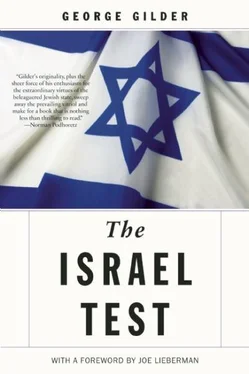The song and the sentiment are as infectious and deadly as the Oxford peace movement that anesthetized Britain before World War II, as the Peace Now mantra that inebriates Israel and many American Jews who believe themselves to be “supporters” of Israel, as the campaigns for nuclear disarmament that seduce American liberals. The single greatest domestic threat to the United States is not the jihad but the peace movement. Countries that fail to meet the challenge of qualitative armament, of military technology, end up at war.
Ronald Reagan’s best moment was his commitment to build anti-ballistic missiles. His worst, most self-indulgent, and foolish moment was his speech advocating the destruction of nuclear weapons. Regardless of any caveats he included, the speech was a horrible blunder that played into the hands of America’s enemies and is still a major weapon in their portfolios. It was his strangest dream moment, and if it were to come true, it would doom the country that he loved.
Now, entirely unsurprisingly, President Barack Obama also is entertaining this fatuous dream. At moments of particular weakness, he speaks of nuclear disarmament. Within a week of assuming office he spoke of destroying 80 percent of America’s nuclear stockpiles. He contemplates abandoning missile defense. His chief asset in making such proposals is his ability to cite Reagan as a precursor on the road to disarmament. To the extent he pursues it, Obama will jeopardize the very existence of this country. With nuclear weapons in the hands of others and without anti-missiles and lacking, too, other advanced technologies, the United States cannot survive as a free country. Arms races are the inexorable burden of all free peoples.
No major nation in history has succeeded in preserving its integrity and sovereignty without meeting the challenge of ever-advancing armaments. For Israel, the issue is obvious. Without maintaining leadership in military technology, the country has no chance at all of survival. But many American intellectuals still imagine that the United States is different, that it is possible or desirable for us to negotiate an “end to the arms race.”
Our enemies will always want to end the arms race because they know only free nations can win it. The crucial test of American leadership is to see through the constant stream of proposals for technological disarmament. All our enemies want to confront us without our qualitative superiority.
An end to the arms race would deprive the capitalist countries of their greatest asset in combating barbarism. The result would bring no relief from military competition but rather its transformation. Arms rivalry would shift from qualitative goals that favor free countries such as the United States and Israel toward quantitative rivalry that will favor our barbarian enemies.
AFTERWORD
My Own Israel Test
In the current arenas of controversy, where Israel is a foreign policy issue, a legalistic argument and a historic debate, I am presenting it chiefly as a test. It begins for everyone as a personal test. It is a test that culminates the long experience of American gentiles with Jewish immigration and rivalry. It is a test for American and other Diaspora Jews who wish to proceed with their lives without concern for Middle Eastern conflicts and moral claims. For Jews and gentiles, alike, it is a test now clouded by confusions, evasions, and misunderstandings on all sides. But I believe that the test is clear and definitive.
In the modern capitalist world, in which the historical extremes of poverty have been widely overcome, the most acute moral issues relate to recognition of accomplishment and superiority — treatment not of the poor but of the particularly gifted people whose work is indispensable to providing opportunities for the poor and for everyone else. In capitalism, as I wrote in Wealth Poverty 30 years ago, the great conflict is not between rich and poor but between incumbent elites and existing forms of capital and the new elites and superior forms of capital that must necessarily displace them if economic progress is to occur.
Thus the paramount conflict in capitalism is between the established system — entrepreneurs, businesses, political movements, and bureaucracies — and the superior minds and methods, vessels of genius and innovation, that threaten to usurp them. On one side stand the alliances of governments and elites, in democracies and tyrannies alike, that distort economies around the globe by protecting the past in the name of social fashions and special interests. On the other side are the inventors, entrepreneurs, industrial innovators, and visionary artists who challenge every establishment.
The Israel test revolves around a fact that is recognized by most people in some form, surreptitious or partial, but is rarely acknowledged openly or explored for its consequences: in any rivalry with intellectual dimensions, disproportionate numbers of both the challengers and of the winners will be Jewish.
Today in America and around the world many of the rich and powerful are Jewish as well. But few people seem to worry much about old money. We are relatively comfortable with traditional wealth and privilege. What is threatening is creative destruction from brilliant and ambitious outsiders. The French have been so preoccupied with this phenomenon that they have supplied us with no fewer than three pejoratives to capture it: the nouveau riches , arrivistes , and the parvenus . All three terms apply readily to Jewish immigrants and business successes as well as to Israel, which stands accused of being the newcomer and upstart nation-state in the Middle East.
In most advanced countries, according to the available data, a hugely disproportionate number of brilliant and ambitious outsiders engaged in intellectual and entrepreneurial activities are Jews. Around the globe, wherever freedom opens up, however briefly in historical terms, Jews quickly tend to rise up and prevail. Jews, historically, have shown vigilance in identifying the main chance and courage in taking it. Together with superior knowledge and talent, this visionary audacity is the essence of entrepreneurial prowess. Understanding and combating the rise of anti-Semitism and anti-Zionism requires fathoming the anxious sense of vulnerability of traditional establishments — intellectual, commercial, military, political, and cultural — as they face the Israel test.
As a youth I learned first-hand the temptations of anti-Semitism. Attending Phillips Exeter Academy in New Hampshire, I devoted nearly all my efforts as a junior at the school to writing for The Exonian , the school’s daily newspaper, while managing barely to scrape by in my classes. I expected to be named an editor of the school paper for my senior year. For generations, my forebears had been editors. I was entitled. Since virtually no other undergraduate had written as many news stories, feature stories, books reviews, and editorials, I thought my ascension was assured.
When the next editorial board was announced, I was shocked to discover that the editor-in-chief was to be a student named Peter Sobol, whom I had scarcely met and who had contributed nothing notable to the paper. I found that most of the other prospective new editors were also only occasional contributors. Three of them were “New York Jews,” as I invidiously observed, who unlike me had achieved high grades, almost effortlessly as it seemed, while I struggled to eke out Cs. If truth be told at the time they were also more accomplished writers than I.
That summer, in a parental campaign to help me catch up on my studies, I was assigned a Radcliffe student two years my elder as a tutor in the classical languages. In an effort to avoid the famously demanding Exeter courses such as American history and calculus, I was aiming for a Classics diploma. The Radcliffe girl (in those times of atavistic “sexism,” we still called female college students “girls”) was named Valerie Ann Leval. The name still can suffuse my brain with remembered effervescence and longing.
Читать дальше












